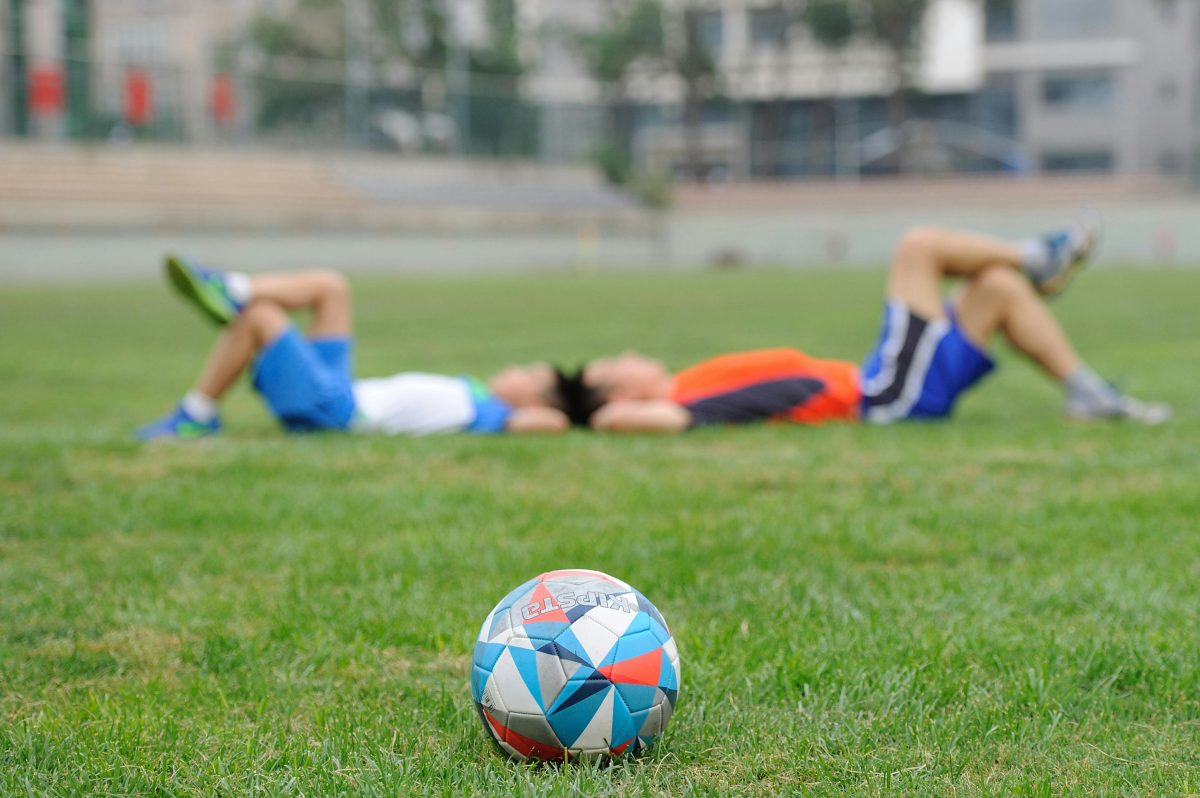Last Updated on: 14th July 2024, 09:04 am
Introduction to Sleep and Athletic Performance

Sleep, often overlooked, plays a pivotal role in an athlete’s physical health and performance. It’s the cornerstone of recovery, allowing the body to repair and strengthen itself after rigorous training sessions. Yet, misconceptions abound, with some athletes underestimating sleep’s importance, believing more training equals better results. This common fallacy overlooks the fact that without adequate rest, the body cannot fully recover, potentially leading to diminished performance and increased injury risk.
Understanding the intricate relationship between sleep and athletic performance is crucial. It’s not just about quantity but also quality. Deep, restorative sleep boosts muscle recovery, enhances cognitive functions, and regulates mood, all vital components of peak athletic performance. By debunking myths and embracing the science of sleep, athletes can unlock their true potential, achieving greater heights in their respective sports.
Understanding the Science of Sleep and Recovery

The Stages of Sleep: REM and Non-REM
- Non-REM Sleep: Starts the cycle, transitioning from light to deep sleep. This stage is crucial for physical recovery, as the body repairs tissues, builds bone and muscle, and strengthens the immune system.
- REM Stage: Takes over following Non-REM, playing a key role in cognitive functions, such as memory consolidation. An optimal balance between these stages is essential for athletes aiming for peak performance.
How Sleep Facilitates Muscle Repair and Growth
During deep Non-REM sleep, the body releases growth hormones, which stimulate muscle repair and growth. This process is vital for athletes recovering from daily training. Adequate sleep ensures muscles have time to heal and grow stronger, preparing the body for the challenges of the next day.
The Impact of Sleep Deprivation on Performance
Lack of sleep can severely impact an athlete’s performance. Even a single night of poor sleep can lead to decreased reaction times, reduced endurance, and a decline in cognitive abilities. Over time, sleep deprivation can result in chronic fatigue, increased injury risk, and impaired judgment. Recognizing the signs of sleep deprivation and taking steps to ensure restful sleep is paramount for maintaining optimal performance levels.
Embracing the science of sleep and recovery not only enhances athletic performance but also improves overall health. By prioritizing restful sleep, athletes can enjoy sustained success in their sports, setting new personal bests and achieving their goals.
Psychological Benefits of Restful Sleep for Athletes

Sleep’s Role in Mental Health and Mood Regulation
Restful sleep is a cornerstone of mental well-being for athletes. It acts as a mood stabilizer, warding off irritability and stress that can cloud judgment and impair decision-making. A good night’s sleep refreshes the mind, fostering a positive outlook that’s crucial for facing the rigors of training and competition.
Enhancing Focus and Cognitive Function Through Better Sleep
Sharp cognitive function is essential for athletes, where split-second decisions can make or break performance. Sleep serves as a reset button for the brain, improving attention, concentration, and problem-solving skills. Athletes who prioritize sleep find themselves more mentally alert and able to strategize effectively during high-pressure moments.
The Relationship Between Sleep, Motivation, and Competitive Performance
Motivation fuels an athlete’s journey, and sleep is its silent ally. Adequate rest not only rejuvenates the body but also rekindles the inner drive to excel. Athletes who enjoy restful sleep consistently report higher motivation levels, directly influencing their competitive performance. This rest-driven motivation is a powerful force, pushing athletes to surpass their limits and achieve greatness.
In essence, restful sleep is not just a physical necessity but a psychological powerhouse for athletes. It molds the mind for peak performance, ensuring that athletes remain focused, motivated, and emotionally balanced. By embracing the science of sleep, athletes can unlock their full potential, both on and off the field.
Optimal Sleep Strategies for Athletes

Establishing a Consistent Sleep Schedule
For athletes, consistency is key—not just in training, but in sleep as well. Setting a regular bedtime and wake-up time trains the body’s internal clock, promoting easier sleep onset and more restful nights. This regularity is crucial, as it ensures that the body gets the deep, restorative sleep needed for muscle repair and recovery.
Creating a Pre-Sleep Routine for Relaxation
A calming pre-sleep routine can significantly enhance sleep quality. Activities such as reading, meditating, or taking a warm bath signal to the body that it’s time to wind down. Dimming the lights and avoiding screens an hour before bed can also help, reducing exposure to blue light, which can disrupt sleep patterns. This relaxation ritual is vital, setting the stage for a night of deep, uninterrupted sleep.
The Role of Napping in Supplementing Night-Time Sleep
Napping is a powerful tool for athletes, offering a chance to recharge when night-time sleep is insufficient. A short nap of 20-30 minutes can boost alertness and performance without interfering with night-time sleep. However, timing is crucial; napping too late in the day can make falling asleep at night more difficult. When used wisely, naps can be an effective strategy to supplement night-time sleep, ensuring athletes remain at their peak.
By embracing these strategies, athletes can significantly improve their sleep quality and duration. This, in turn, enhances recovery, performance, and overall well-being. Sleep, often the unsung hero of athletic success, deserves its place in the spotlight. With a commitment to restful sleep, athletes can unlock their full potential, achieving new heights in their sports endeavors.
Nutritional Considerations for Improving Sleep Quality

Optimizing sleep quality transcends mere sleep hygiene practices; it encompasses nutritional strategies that can significantly enhance restorative sleep. Certain foods and nutrients play pivotal roles in promoting better sleep, acting as natural sleep aids that encourage relaxation and drowsiness.
Key among these are foods rich in magnesium, such as almonds and spinach, which help relax muscles and nerves, fostering a state conducive to sleep. Tryptophan, an amino acid found in turkey, milk, and cherries, is another sleep-promoting nutrient, aiding in the production of serotonin and melatonin, hormones that regulate sleep cycles.
Complex carbohydrates, found in whole grains and vegetables, also contribute to better sleep quality. They help in the gradual release of glucose into the bloodstream, preventing sleep disruptions. Pairing these with lean proteins can further enhance the sleep-promoting effects, as they help stabilize blood sugar levels throughout the night.
The timing of meals is equally crucial. Eating a heavy meal too close to bedtime can disrupt sleep, as the body is busy digesting rather than relaxing. Aim for a light meal or snack, rich in the aforementioned nutrients, about two to three hours before bed to ensure optimal sleep quality.
Conversely, certain substances can impair sleep quality. Caffeine and alcohol, while seemingly beneficial in the short term, can significantly disrupt sleep patterns. Caffeine, a stimulant, can delay sleep onset, while alcohol, although initially sedative, can lead to fragmented sleep. Limiting intake of these substances, especially in the hours leading up to bedtime, is essential for maintaining restful sleep.
By incorporating these nutritional considerations into their daily routines, athletes can significantly improve their sleep quality. This, in turn, enhances recovery, performance, and overall well-being, underscoring the profound impact of diet on sleep and athletic performance.
Technological and Environmental Enhancements for Sleep

Evaluating the Effectiveness of Sleep Tracking Devices
With the advent of wearable technology, sleep tracking devices have become a popular tool for monitoring sleep patterns. These gadgets provide insights into sleep duration, quality, and disturbances, empowering athletes to make informed adjustments to their sleep routines. While they offer valuable data, it’s important to note that accuracy can vary, and they should not replace professional medical advice.
The Pros and Cons of Using Sleep Aids and Supplements
- Pros: May help induce sleep and regulate sleep cycles, particularly for those struggling with sleep disorders.
- Cons: Reliance on these aids can lead to tolerance and potential side effects.
Natural supplements like melatonin may offer a gentler alternative, but it’s essential to consult with a healthcare provider before starting any regimen.
Environmental Modifications for an Ideal Sleep Setting
Creating an environment conducive to sleep is critical. Factors such as a dark, quiet, and cool room can significantly improve sleep quality. Consider the following enhancements:
- Blackout curtains
- White noise machines
- Temperature control
Additionally, investing in a comfortable mattress and pillows tailored to personal preferences can make a substantial difference in achieving restful sleep.
By leveraging technology wisely, considering the judicious use of sleep aids, and optimizing the sleep environment, athletes can enhance the quality of their rest. These strategies, when combined with good sleep hygiene, pave the way for improved recovery and performance, highlighting the undeniable link between sleep and athletic success.
Implementing a Sleep Plan for Athletic Success

For athletes aiming to elevate their game, a well-structured sleep plan is as crucial as their training regimen. The journey to optimizing sleep begins with a thorough assessment of current habits. This involves tracking sleep duration, quality, and any disturbances, laying the groundwork for meaningful improvements.
Setting realistic sleep goals is the next pivotal step. These goals should be tailored to individual needs and schedules, focusing on both the quantity and quality of sleep. Clear objectives guide the path forward.
Monitoring progress is essential. Regularly reviewing sleep data can reveal patterns and trends, shedding light on what’s working and what isn’t. This ongoing evaluation allows for timely adjustments to the sleep plan, ensuring it remains aligned with the athlete’s evolving needs and circumstances.
Adjusting strategies as needed is a dynamic process. It may involve tweaking bedtime routines, modifying the sleep environment, or even consulting with a sleep specialist. Flexibility and adaptability are key, as what works initially may require refinement over time.
By systematically assessing current sleep habits, setting realistic goals, diligently monitoring progress, and being open to adjustments, athletes can forge a path to improved sleep. This, in turn, sets the stage for enhanced athletic performance, underscoring the profound impact of restful sleep on achieving sporting excellence.
In Closing
Sleep is the unsung hero of athletic success. It’s the foundation upon which resilience and peak performance are built, enabling athletes to push beyond their limits. Through a harmonious blend of restorative sleep, nutritional wisdom, and strategic recovery practices, athletes can unlock unparalleled heights of performance and well-being. As we look to the future, let this be a call to action for athletes everywhere to prioritize restful sleep, embracing it not as a luxury, but as a critical component of their training regimen.
The Importance of Restful Sleep for Athletes FAQs
Yes, lack of sleep can negatively affect an athlete’s mental health, leading to increased stress, anxiety, and risk of depression. Sleep deprivation can impair cognitive functions, affecting decision-making, focus, and emotional regulation, which are critical for athletic performance and overall well-being. Ensuring adequate rest is therefore essential for both physical and mental health.
Napping can be highly beneficial for athletes, especially when night-time sleep is insufficient or as a way to boost recovery during intensive training periods. Short naps of 20-30 minutes can enhance alertness, mood, and performance without interfering with night-time sleep. Strategic napping can serve as an effective tool in an athlete’s recovery regimen, complementing regular sleep routines.
Yes, the timing of sleep matters for athletes, as adhering to a regular sleep schedule can enhance sleep quality and overall recovery. Going to bed and waking up at the same time every day helps regulate the body’s internal clock, leading to more restorative sleep. Disruptions to this schedule, such as late-night training or travel across time zones, can impair recovery and performance.
Athletes can improve their sleep quality by establishing a consistent sleep schedule, creating a restful environment, and avoiding stimulants like caffeine and electronics before bedtime. Implementing relaxation techniques, such as meditation or deep-breathing exercises, can also help promote better sleep. These practices aid in enhancing the depth and duration of sleep, which is crucial for recovery and performance.
Sleep significantly impacts muscle recovery through the release of growth hormone, which occurs during deep sleep stages. This hormone plays a key role in tissue growth and muscle repair, making sleep crucial for athletes looking to recover from training and improve muscle strength. Lack of sufficient sleep can slow down the recovery process and increase the risk of injuries.
Sleep deprivation can significantly impair an athlete’s recovery by reducing the body’s ability to repair muscles and restore energy levels. It can lead to prolonged muscle soreness, delayed healing of injuries, and a weakened immune system, making athletes more susceptible to illnesses. Prioritizing sleep is therefore crucial for effective recovery and sustained athletic performance.
Chronic sleep deprivation can lead to a decline in athletic performance, increased risk of injury, and longer recovery times. Over time, it can also impair immune function, reduce growth hormone production, and increase the risk of chronic conditions such as obesity and cardiovascular disease. Addressing sleep issues is critical for athletes to maintain health, performance, and career longevity.
The recommended amount of sleep for athletes is typically 7 to 9 hours per night, though some may benefit from up to 10 hours to fully recover from intense training. Individual needs vary, and factors such as training load, stress levels, and travel can influence the amount of sleep an athlete requires. Listening to one’s body and adjusting sleep duration to meet personal recovery needs is essential.
Sleep plays a pivotal role in athletic performance by affecting reaction times, accuracy, and endurance. Adequate sleep helps optimize cognitive functions and physical health, enabling athletes to perform at their best. Conversely, sleep deprivation can lead to decreased performance, slower reaction times, and a higher risk of errors and injuries.
Athletes require more sleep because it enhances physical recovery and performance. During sleep, the body undergoes repair processes that are critical for muscle recovery and energy restoration, which are essential for athletes to maintain high levels of performance. Additionally, adequate sleep improves cognitive functions that are vital for strategic thinking and reaction times in sports.
Orlando is a all round athlete from Australia, now resident in Germany. His sports of passion of American Football(Offensive line), weight training and indoor rock climbing where he uses his 195cm wing span to his advantage.



